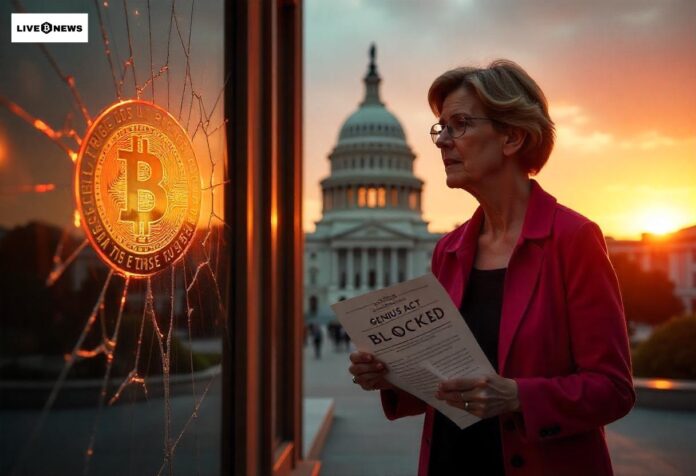- Warren blocks GENIUS Act over Trump stablecoin concerns.
- Trump stablecoin USD1 surges to 7th largest globally.
Senator Elizabeth Warren has come out strongly against the proposed GENIUS Act, a cryptocurrency bill, because of what she believes could be corruption in a Trump family stablecoin deal with the United Arab Emirates. The debates in the Senate have become heated as lawmakers discuss the future of stablecoin regulation in the U.S. Her opposition has intensified them.
Warren openly denounced the meteoric ascent of the Trump family stablecoin, which has become the seventh biggest cryptocurrency in the world, on May 4, 2025. In one example, she said a $2 billion deal involving a UAE-backed fund was evidence of questionable financial ties. The stablecoin, designated USD1, is administered by World Liberty Financial, a firm where Donald Trump holds the position of “chief crypto advocate” and his kids function as “Web3 ambassadors.”
The Senate should not pass legislation that would enable such financial arrangements, Warren said. She pointed out that foreign governments could use the stablecoin to funnel massive sums into the family of Trump while bypassing transparency and accountability.
The scale and timing of the UAE deal have attracted a lot of attention. Abu Dhabi’s sovereign wealth fund linked investment firm MGX pledged to spend USD1 for every USD2 it invests at Binance. The stablecoin has so far racked up over $550 million in sales since November 2024, and this move came shortly after Trump’s re-election.
Economic Context and Market Impact
And the controversy is occurring right on top of a U.S. economy in flux. Recently, data shows GDP contraction in the first quarter of 2025 and slow job growth. Stablecoins, which are 1:1 to fiat currencies like the U.S. dollar, are generally viewed as a stabilizing force in the crypto space, but Warren has concerns that this may not always be the case.
The same month, the Senate Banking Committee also passed the GENIUS Act by an 18–6 bipartisan vote in March of 2025 to create clear rules for stablecoin issuers. Senator Bill Hagerty sponsored the bill that is commended for supporting innovation and maintaining U.S. leadership in the global digital asset market. Warren’s opposition, however, could make it unclear that it will pass immediately, as she says it could also allow for shady financial practices rather than protecting consumers.
On April 15, 2025, a distinct post on X indicated that the UAE intends to increase its investments in the U.S., adding another layer to the existing situation. The Gulf state promised to invest $1.4 trillion over the next ten years to boost artificial intelligence, semiconductors, and energy. The announcement comes after a visit to Washington by UAE National Security Advisor Sheikh Tahnoon bin Zayed that illustrates the strengthening of economic ties between the two nations. The accord fits into Trump’s drive to get foreign investment into the country, but critics say it clouds the line between public policy and private benefit.
This debate has centred around the stablecoin USD1. Since its launch post-election, the cryptocurrency has quickly climbed the crypto rankings, causing both excitement and skepticism. Supporters see it as a private sector innovation, whereas Warren’s attack focuses on the lack of oversight and the risk of foreign influence in U.S. financial systems. Now the Senate will have to decide whether to move the GENIUS Act forward or regulate Warren’s concerns more stringently.





